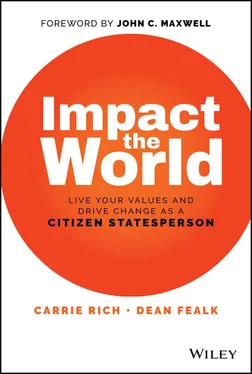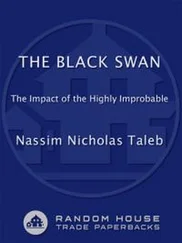That's why the values we're discussing are so critical. Without drive, a person can't find the motivation to get involved in civic work. Without practicality, one can't navigate existing obstacles. Without perspective, one can't envision the impact that is possible through their own applied effort. The values that describe citizen statespeople—from realism to focus to leadership to scale—don't just help citizen statespeople achieve their goals; they also get regular people to the starting gate, helping others achieve their potential and become citizen statespeople themselves.
Evolving into a citizen statesperson often starts at a local level, solving problems for local people. In some cases, this kind of service can manifest a form of training; an opportunity to become educated as a leader while positioning yourself to make a unique and outsized impact. Local service also teaches you how to find the heart of a challenge—to get as close as possible to decision‐makers and stakeholders to design solutions and make a difference. From there, you can build awareness about an issue by engaging media or by protesting injustice. You can meet concerned individuals and put people and powerbrokers in the same room. If you can make an impact in your neighborhood, you can look outward to similar challenges that impact larger communities and affect broader populations; scale your service outward to apply your knowledge to more expansive issues.
This kind of outward progression isn't theoretical. It's real.
As a young person in Nigeria, Mene Blessing witnessed the challenges facing agricultural workers on the continent. With 80 percent of smallholder farmers in Africa subsisting on an income of less than $2 a day, meeting the high cost of food for poultry and livestock is often a challenge. His personal experience led him to set up Unorthodox Feeds Innovation for Rural Enterprising Smallholder Farmers, or UNFIRE—a program that provides farmers with feed costing 60 percent less than regular options, enabling farmers to increase their output and their incomes by as much as 80 percent. Produced from agricultural waste, such as mango seed kernels, elephant grass, maize, and cassava waste from milling plants, UNFIRE's feed is unique, culturally acceptable, and suitable for a range of poultry and livestock. It's sustainably produced, too, with UNFIRE operating a community‐based, self‐supportive model. Local youth groups are engaged in the collection of fair‐trade raw materials that are purchased by UNFIRE, and rural women are recruited, trained, and empowered to run their own businesses as vendors, supplying and selling the feed within their own communities. The model was designed to benefit both farmers and their communities.
The program worked. During Mene's pilot, some 58 tons of mango seed waste was recovered and used by UNFIRE teams as part of a partnership with JA Farms in Nigeria. During an 18‐month pilot program, 5,000 consumers benefited. Twenty‐seven young people were engaged to help collect raw materials and 10 women vendors were employed to sell the seed. Each of these vendors, who were previously unemployed, generated the equivalent of local minimum wage. More than 14 million grams of livestock products were produced over the 18‐month period, including 45,000 eggs and 3,070 chickens.
Mene didn't stop there. Instead, he built his work further, and went on to co‐found and become COO of Vetsark, a data science social enterprise working to help predict and prevent disease and pest outbreaks in Nigeria. He used his success to help develop other citizen‐statespeople; in 2016, he co‐founded Inspire Africa—a Pan‐African institution designed to transform the careers and life trajectories of a new generation of leaders and entrepreneurs in Africa by delivering high‐impact entrepreneurship and leadership education to African youth. Against the backdrop of Nigeria's 58.1 percent youth unemployment rate, Inspire Africa trained 3,000 young people, helped fund more than 120 business ventures, and created more than 300 jobs.
Mene was not groomed into office by a political patron. He wasn't given a public platform by a well‐heeled relative. Instead, Mene harnessed his ability to make an impact by using his values and skills to build a coalition for change. He appointed himself to solve hunger in Africa, helping to support farmers and consumers alike. Then he appointed himself to address the education to employment gap, enabling young peers to compete in today's evolving markets and ensuring that talent does not remain on the sideline. Mene's journey is just beginning; as a citizen‐statesperson, Mene is still looking for ways to expand impact outward, to develop effective solutions, and to fuel ever‐larger change.
That's how an individual can use local knowledge to make a global impact. For people around the world, that's how one citizen statesperson's leadership can change lives and set a new course for the future. That's the power of a citizen‐statesperson.
How do you embody the traits of a citizen statesperson?
What values drive your interest in citizen statespersonship?
What does your local community look like? What community is at the heart of the change you want to make?
1 1.John Gramlich, “Looking ahead to 2050, Americans are pessimistic about many aspects of life in U.S.,” Pew Research Center, March 21, 2019, https://www.pewresearch.org/fact-tank/2019/03/21/looking-ahead-to-2050-americans-are-pessimistic-about-many-aspects-of-life-in-u-s/.
2 2.Megan Brenan, “Americans' Confidence in Major U.S. Institutions Dips,” Gallup, July 14, 2021, https://news.gallup.com/poll/352316/americans-confidence-major-institutions-dips.aspx.
2 What It Takes
Key Takeaways
A citizen statesperson finds opportunities to develop leadership skills, follow their passion, and make a difference in local communities and on a global level.
Acting as a citizen statesperson puts demands on finances, time, and relationships. Passion and drive make the tradeoff worthwhile.
A citizen statesperson is uniquely positioned to adopt a multifaceted viewpoint that helps develop unlikely solutions to advance a cause.
BEING A CITIZEN statesperson is issue‐ and geographically agnostic. That's not to say that citizen statespeople aren't passionate about specific issues or focused on specific places; to the contrary, a deep interest in an issue can be essential to progress, and a sense of place—a commitment to a local community or population—can help a citizen statesperson build social capital and create an effective movement. Instead, what it means is that passion around any issue offers the opportunity for citizen statespersonship, and any location or community can be a hub and launching pad for change. In that way, citizen statespersonship has the ability to cut through the greatest challenges of our time, providing a universal mentality and approach capable of solving problems at scale.
The ability to look beyond a specific place or a specific issue area is a useful asset. Today, the world is more interconnected and interdependent than ever before. As a result, most major challenges transcend geographic boundaries. At the same time, few problems can be placed into clear‐cut subject or topical boxes; from economic hardship to climate change, from violent conflicts to social justice, individual challenges often have cross‐cutting roots and expansive impacts. The ability to work across disciplines and issue areas proves immensely helpful.
That mentality—understanding the value of context and connections—is key, because being a citizen statesperson requires the skill to connect meaningfully with others. The citizen statesperson thinks about how to convene people, how to gain knowledge through dialogue, and, ultimately, how to use the power of one‐on‐one interactions to move issues forward. Whether you are acting as a citizen statesperson locally or working abroad—and whether your work is narrowly focused or more expansive—openness to these connections allows you to have greater impact in your community and in the causes most important to you.
Читать дальше












